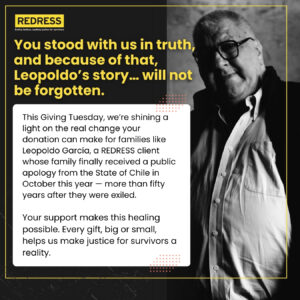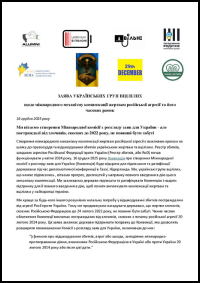
Publications
REDRESS’ publications are also available in hard copy format. Please contact us for further information on [email protected].


Statement by Ukrainian Survivor Groups Regarding the International Compensation Mechanism for Victims of Russian Aggression and Its Temporal Scope
Joint statement by Ukrainian survivor groups on the establishment of an International Claims Commission for Ukraine, calling on States to sign and ratify the Convention but stressing the need for an inclusive and victim-centred approach to reparations, including victims who were harmed before the full-scale invasion.
Download options
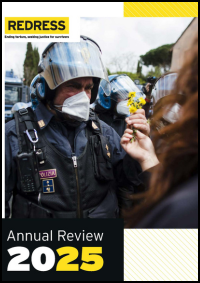
Annual Review 2025
This annual review highlights the activities and achievements of REDRESS from 1 April 2024 to 31 March 2025, but also includes some more recent updates. It showcases REDRESS’s legal victories, ranging from a UK ruling that intelligence services must never encourage or facilitate torture to judgments in favour of survivors in Nigeria, Sudan, Lithuania, and Turkey. Alongside this casework, we championed innovative approaches to reparation, including the use of Magnitsky sanctions in Georgia, Angola, Iran, and Sudan, while strengthening the movement through partnerships, knowledge-sharing, and organisational support.
Download options
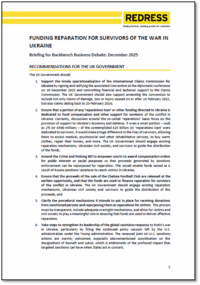
Briefing Paper: Funding Reparation for Survivors of the War in Ukraine
This briefing paper was prepared for the Backbench business debate on the war in Ukraine in the House of Commons Chamber last 4 December. It provides a background on the UK's response to Russia's full-scale invasion of Ukraine, victims' right to reparation and the work of the Register of Damage and the proposed establishment of the Claims Commission, and our recommendations to the UK Government on funding reparation for survivors of the war in Ukraine.
Download options
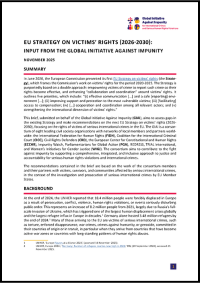
Briefing paper: EU Strategy on Victims’ Rights: Input from the Global Initiative against Impunity
This brief, submitted on behalf of the Global Initiative Against Impunity (GIAI), assesses gaps in the EU’s first Strategy on victims’ rights (2020–2025) and sets out recommendations for the next Strategy (2026–2030), focusing on the rights of victims of serious international crimes in the EU. It examines the Strategy’s stated priorities of empowering victims, improving support and protection, facilitating access to compensation, enhancing coordination, and strengthening the international dimension of victims’ rights. The recommendations draw on the work of consortium members and partners with victims, survivors, and affected communities in the investigation and prosecution of serious international crimes across EU Member States.
Download options
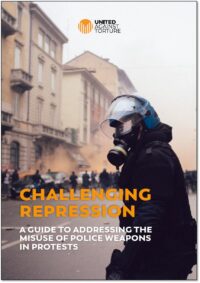
Challenging Repression: A Guide to Addressing the Misuse of Police Weapons in Protests
This document is designed to provide practical guidance for these stakeholders to assist them in identifying, documenting, and challenging such misuse in a protest context. It complements several existing resources, including the United Against Torture Consortium (UATC) Policy Paper – Protesting without Fear (2025), the OSCE Guide on Law Enforcement Equipment Most Commonly Used in the Policing of Assemblies (2021), and Lethal in Disguise 2 (INCLO and Physicians for Human Rights, 2023), and brings a specialist focus on equipment used in protest contexts.
Download options
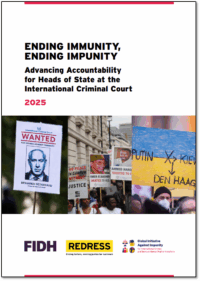
Ending Immunity, Ending Impunity: Advancing Accountability for Heads of State at the International Criminal Court
The Rome Statute affirms that even the most powerful individuals can be held to account when national systems fail. For millions denied justice at home, the International Criminal Court offers a vital source of hope. That hope diminishes each time a State Party declines to arrest a sitting head of state wanted by the Court on grounds of personal immunity. Such failures erode the collective commitment underpinning the Rome Statute and risk turning a clear legal framework into a political choice. This paper explains why personal immunities cannot bar cooperation with the International Criminal Court and why reaffirming this principle is essential to preserving equality before the law and ensuring the Court remains a credible avenue for accountability.
Download options
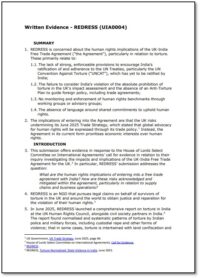
Submission to the House of Lords Inquiry on the UK-India Free Trade Agreement
This submission offers evidence in response to the House of Lords Select Committee on International Agreements’ call for evidence in relation to their inquiry investigating the impacts and implications of the UK-India Free Trade Agreement for the UK. This submission addresses the question: What are the human rights implications of entering into a free trade agreement with India? How are these risks acknowledged and mitigated within the agreement, particularly in relation to supply chains and business operations?

